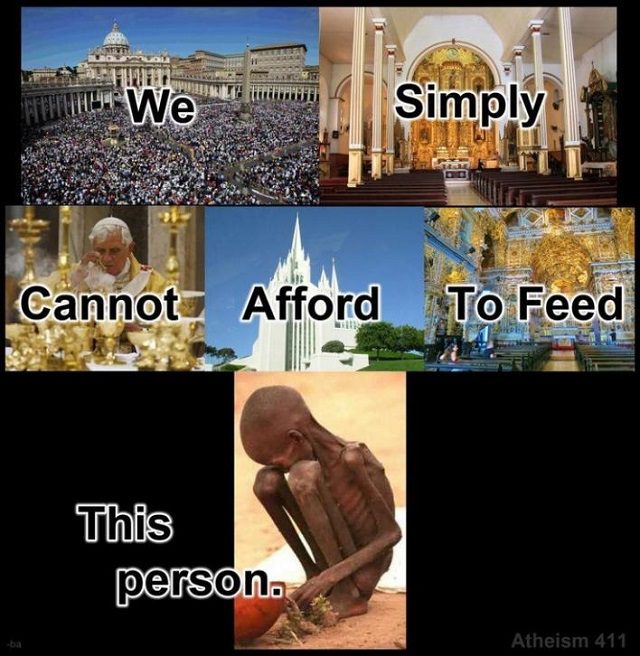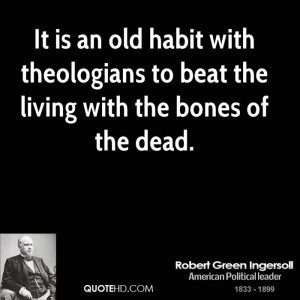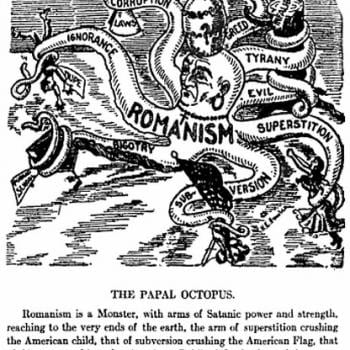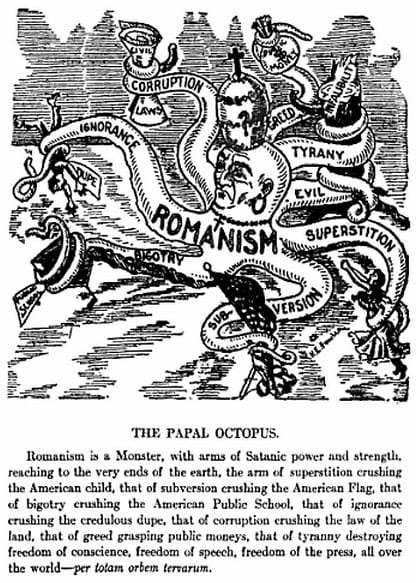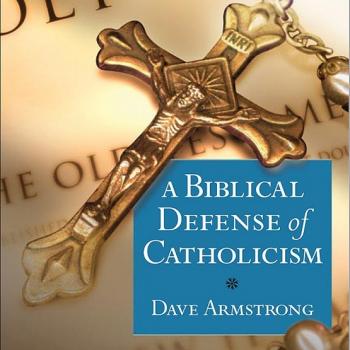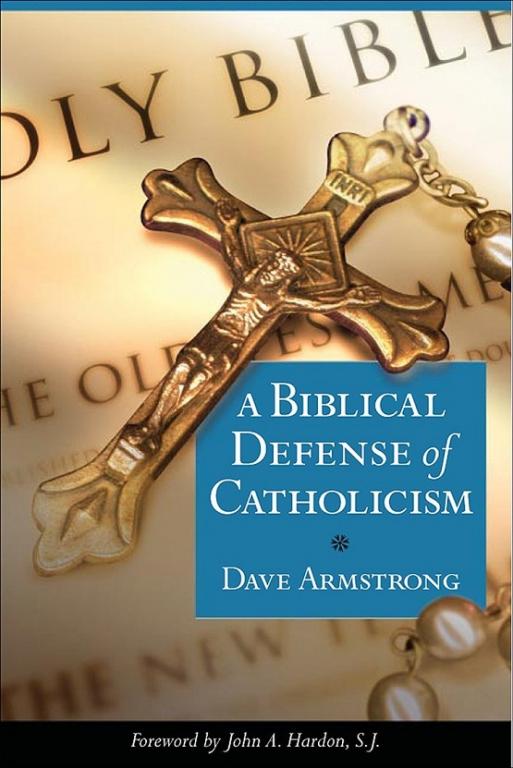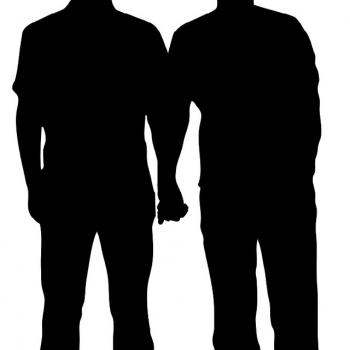Introduction added on 3-16-11:
***
This was dug deep out of the Armstrong Archives, after someone asked about it today. It was uploaded from a debate on a public discussion list, dominated by evangelical Protestants, on 11 January 1999. I found it on Internet Archive and then after glancing through it decided to restore it to my blog. I’m not sure why this was removed.
I don’t even bother debating anti-Catholic Protestants (as this person was) anymore. If you read this, you’ll see why. I don’t have the patience of Job! I spent several years debating these guys (it’s always — always — the same), and then (in 2007) figured that I had more than adequately done my “apologetic duty” and decided that sanity was also an important thing to preserve. :-)
I have expanded some of the original links to other papers of mine (and most of the new links were written since the original dialogue). Matthew Bell’s words will be in blue.
* * * * *
Please tell me what other religious groups you classify as “heresy” or “cultic” which are trinitarian, believe in the Incarnation, bodily Resurrection of Christ, the Atonement, the Second Coming, formally canonized the Holy Scripture, believe in salvation by grace alone (i.e., we are not Semi-Pelagians), heaven, hell, baptism, the Virgin Birth, the infallibility of Scripture, angels, the devil, creation, etc., etc. And which produced great saints and scholars like Augustine, Jerome, Anselm, Aquinas et al – many of whom Protestants acknowledge – somewhat curiously and inconsistently – as even their own forebears?
Other groups which would embrace most, if not all of the above would be The Family, The Christians, Word of Lifers, Zerrubabel, The London (Boston) Church of Christ, and possibly more.
*
Okay, fair enough; please define “Christian,” then, and who fits into that category, according to you.
*
A Christian is an individual whose life has been transformed by the Grace of God from a hellbound sinner, to a heavenbound saint, this being made possible and accomplished by and through the Person of Jesus Christ and his efficacious sacrifice.
*
How do you know when you have found such an individual?
*
The effect of this transformation will lead to that individual’s life being in conformity to the Scriptures in both doctrine and practice as the Holy Spirit leads and enables them.
*
What doctrine? Which doctrines? What practices? This gets back to what I was driving at. You make a statement like this, but if there is no specific content to back it up, then it is literally meaningless. New Testament Christianity has content.
*
You meet an individual, engage them in conversation, the result of which they claim to be a Christian, yet speak of Jesus being a created being, or modern-day prophets giving new Scriptures. Immediately you have ascertained that the individuals doctrine does not conform to the Bible, hence their is a problem with their claim to be a Christian which needs to be further explored. A simple process where the Scriptures are the authority by which a person’s claims are measured by.
*
Well, I agree with all this, but I don’t believe these things, so you have to explain why I am out of the circle.
*
Who fits into that category is judged by the Scriptures and not by men, least of all me.
*
Good, then you can’t know that I am not a Christian, and ought to extend to me the right hand of fellowship, no?
*
Incorrect, you have made the claim to be a Christian, you have demonstrated your beliefs (doctrine) on this list and via your website. Those beliefs are not in accordance with the Bible,
*
But the same thing holds for other Protestants with whom you disagree (as I will demonstrate below), because you are obviously the final arbiter in your mind – which is why I have referred to you as “your own pope.” This is what the absurdity of your position comes down to: whoever disagrees with you is not a Christian. Why? Because they disagree with you (i.e., the one with the correct biblical interpretation). This is both circular and extremely arrogant. You might as well claim to be a prophet, with this tunnel-vision attitude. I don’t even need to explore the historical absurdities which your position entails, because it is already evidently self-refuting.
*
I don’t need to answer the why, because the statement it is based upon is false. Nothing could be further from the truth. I run CCBE (an email list – Christians Combatting Biblical Errancy (sorry for the plug :0). On that list there are many Christians with whom I would disagree with some of their positions on some issues and vice versa. Do I say they are not Christians? No, I do not.
*
Then you have yet to explain why I am not a Christian, in your eyes. You have to explain why Catholics are out on certain issues, whereas other Protestants who agree with us on those issues are still in.
I do not consider the consensus minimal enough to include yourself. How many differences on primary doctrinal matters does it take to make the difference between acceptance and rejection of as group as Christian?
*
This is your problem, not mine. I define a Christian (doctrinally) as anyone who subscribes to the Nicene Creed.
I don’t accept you as a brother in Christ because of the doctrine you hold as being Scriptural truth.
*
Which are those?
*
If it contained nothing but the above creeds then that would be a different matter. It does not, and what you believe as well as those creeds is what makes the difference.
*
But the creeds are minimalistic in the first place. All groups presumably add on their own things. Sola Scriptura isn’t in the creeds. Sola fide isn’t in there. A host of other Protestant distinctives aren’t there (denominationalism, symbolic baptism and Eucharist, assurance of salvation, TULIP, congregationalism, etc.). I can say the same about you and read you out of the faith on the same basis.
*
How do you interpret “the communion of saints” from the Apostles’ Creed? Or “the holy Catholic Church”? Or the “one holy catholic and apostolic Church” of the Nicene Creed? Or “baptism for the forgiveness of sins” (baptismal regeneration) from same? It seems that you have more difficulty believing these Creeds than I do. Yet you claim you are “in” and I am “out” on this basis. Your criteria for who is a Christian have more holes in ’em than a pin cushion.
*
I do not accept the creeds because of who wrote them, but what is written in them, the which I recognise as being Biblical based truth. One must evaluate a group on the whole package, not just on the common denominators.
*
Fair enough. Please explain, then, the following clauses, so I can know exactly where you agree and disagree with the Creeds.
*
hence judgement needs to be reserved on considering you a brother in Christ until further dialogue has occurred to explore those doctrines which you hold.
*
I’m happy to both talk about and defend my views from Scripture (as everyone here already knows, I’m sure).
An individual could be saved and be a Christian whilst being a Roman Catholic, a Mormon, a JW etc etc.
*
Can a person who denies the Trinity be saved? This is the very doctrine of God . . . The Athanasian Creed would suggest otherwise.
*
The result of that salvation would be a departure from those organisations as the error of them became apparent to the same individual through the convicting power of the Holy Spirit and the Providential working of God in their life.
*
Which denomination is the true one? If I leave Catholicism, where do I go? And tell me what makes you the authority on these matters anyway?
*
I am not the authority, the Scriptures are.
*
As authoritatively interpreted by whom? You? What if someone disagrees?
*
As authoritatively interpreted by the consensus of the priesthood of all believers. Any church, whether it be the Roman Catholic, Protestant denomination, Jehovah’s Witnesses exists only because a number of people believe that within such is a right interpretation and application of the Bible.
*
What is this right application and interpretation? The only “consensus” which has been achieved already is minimal enough to include Catholics – because Protestants disagree amongst themselves on virtually all points other than those which are held in common with us.
*
They judge both you and me, in faith, doctrine and practice.
*
Agreed. But we have to know what the Bible teaches.
*
Every Christian through the priesthood of all believers has the right to apply Scripture and its authority to another individual or organisation.
*
Okay, so how do we decide who is right when it is applied in contradictory ways? Do you acknowledge any corporate Christian authority higher than yourself? Or is it just you and the Holy Spirit?
*
I acknowledge both the creeds of the one true catholic church.
*
Which creeds are those?
*
The Apostles, Nicene & Athanasian.
*
The latter two creeds were put forth by Catholics (the Nicene, in an Ecumenical Council presided over by a pope), and I as a Catholic accept them. How is it, then, that you don’t accept me as a brother in Christ? And of course the people who wrote these creeds believed in a host of things which you despise: Real Presence, episcopacy, baptismal regeneration, prayers for the dead, Tradition, apostolic succession, infused justification, veneration of Mary and the saints, penance, purgatory, confession, etc., etc. Your position is completely incoherent.
*
and the Scriptures on which they are based as higher than any individual or organisation. I am bound by the authority of the Scriptures as you are. The Holy Spirit is the guide of the Christian’s life. That guidance however, will always be in accordance with God’s revealed word.
*
I agree with all this, but I still want to know who is the authoritative interpreter of Scripture.
*
The Scriptures are the God-given authority by which all men are judged. What will become obvious to all as they follow this dialogue is that your confidence is ultimately in the arm of flesh whereas mine is in God’s revealed word.
*
Please elaborate. I would say — if anything — quite the contrary (though I am very reluctant to make judgments of someone’s heart, as you are). You seem to think you have the proper interpretation of Scripture all locked up, so in the final analysis you are trusting in yourself, and you are flesh.
*
I, on the other hand, bow to the authority and omniscience and omnipotence of God, whom I believe has guided the Fathers and the universal Church for 2000 years, in order to determine and proclaim and preserve the truths of Christianity. That is anything but reliance on man. It is having so much faith in God that I believe He can preserve His truths by both written Revelation and in His Church (which, e.g., was necessary to determine the Canon of that same Revelation.
*
Are you suggesting that as long as one embraces all the above it matters not what other doctrines a church espouses?
*
I’m suggesting that one must have a working definition of “Christian” to make any sensible, believable analysis as you attempt to make here, and such a definition, it seems to me, will have to be “minimalistic” to some extent, else many many groups even among Protestants would necessarily be excluded from it. This is your problem.
*
You have to somehow come up with a self-generated authority to proclaim who is and isn’t in the fold. That makes you a “Super-Pope,” as you are exercising far more authority than the pope does – and arbitrarily and inconsistently at that. Your opinion is hopelessly incoherent, self-defeating and self-refuting.
*
That those other doctrines cannot indirectly impact on those which are fundamental?
*
Yes (theology being inherently inter-connected), but note that even you freely acknowledge certain doctrines as “fundamental” – which is my point. But which are those? And by what authority do you determine that? By what method?
*
I determine such from the Scriptures.
*
Great. Now give me a list of them so I will know what I have to believe to rise to the level of “Christian.” That would be the only charitable thing for you to do, right? You claim possession of Christian truth in a way which excludes many others, so it is only fair to let us in on this truth — in some detail, not cryptic utterances and fashionable evangelical lingo.
*
Herewith a summary of primary doctrines:
*
1. The Scriptures of the Old and New Testament were given by inspiration of God and as such are the sole divine authority and rule for Christian faith and practice.
*
Catholics believe in the material, but not formal sufficiency of Scripture. I believe that all theological truths are present in Scripture either explicitly or implicitly, or clearly deduced from other more clearly-presented biblical truths. We believe this because we believe it is what the Bible itself teaches about authority, and what the Christian Church held for 1500 years before Luther came onto the scene and introduced unapostolic novelties.
*
Orthodox, Anglicans, and Methodists and Lutherans (the latter two only to some extent) agree with us on this, and there are many varying interpretations of sola Scriptura – not all of which thumb their nose at 1500 years of Church history as you seem to do.
*
2. That there is but one living and true God, who is infinitely perfect, the Creator, Preserver and Governor of all things and who is the only proper object of religious worship.
*
This is Catholic belief.
*
3. That there are three Persons in the Godhead – the Father, Son and Holy Spirit, undivided in essence and co-equal in power and glory.
*
This is Catholic belief.
*
4. That in the person of Jesus Christ the Divine and human natures are united, so that he is truly and properly God and truly and properly man. This same Jesus is the One Mediator between men and God.
*
This is Catholic belief.
*
I disagree with you, unless you are prepared to state that you do not make any approach to God through Mary, or the saints?
*
Sure we do; we ask others to pray for us just as you do. Have you never asked someone to pray for you? They are acting as a mediator. So your position is self-refuting once again.
*
Read it again. ONE MEDIATOR. Not two, not three, not countless, ONE. I need go through no-one to have access to Jesus. He needs no appeasing.
*
Agreed, But why, then, do you ask others to pray for you, and pray for them? Why don’t you tell them that they can and should go to Jesus and to leave you alone, so you can have more time to offer adequate and reasonable answers to my posts?
*
5. That our first parents were created in a state of innocency, but by their disobedience they lost their purity and happiness, and that in consequence of their fall all men have become sinners, totally depraved, and as such are justly exposed to the wrath of God.
*
We believe in total inability to save oneself, but not total depravity, and are joined in this by Arminian, non-Calvinist Protestants.
*
The above point is a doctrinal statement of an Arminian church, of which I was a part of since my childhood until the age of 28 (I am now 31). Total depravity is not particular to Calvinism.
*
Please define it then in a non-Calvinist manner, if you would. Does it wipe out free will? Does it involve double predestination?
*
6. That Jesus Christ, by his suffering and death has made an atonement for the whole world so that whosoever will may be saved.
*
This is Catholic belief. But it would seem to be inconsistent with your view unless you believe in Universal Atonement.
*
7. That repentance towards God, faith in Jesus Christ and regeneration by the Holy Spirit are necessary to salvation.
*
This is Catholic belief.
*
8. That we are justified by grace, through faith in out Lord Jesus Christ and that he that believeth hath the witness in himself.
*
This is Catholic belief. We would, however, deny “faith alone” as an unbiblical and novel idea, introduced in the 16th century.
*
One is saved by grace through faith, the which produces works. Works are the product of salvation by grace through faith, not the means to being saved. Such is thoroughly Scriptural, an immediate example being Ephesians 2:8,9.
*
No one believed this till the 16th century. Does that mean no one was a Christian till then?
*
9. That it is the privilege of all believers to be wholly sanctified, and that their whole spirit, soul and body may be preserved blameless unto the coming of the Lord Jesus Christ.
*
Interesting. So you are in the Wesleyan strain of thought on this? This is close to our belief, but in conflict with “faith alone,” strictly applied.
*
There are no doubt many more, but there is sufficient in the above to outline those primary doctrines you requested.
*
OK, so anyone who denies any of these is not a Christian?
*
No, anyone who denies these must demonstrate to me from Scripture why they are erroneous. If such is done, and I am convinced by the Scriptures that they are correct then I will forego that doctrine. If am not convinced then I would seek to convince them from Scripture that their position was the one that required change.
*
I have certainly attempted to do that. Whether or not you are willing to interact exegetically with my arguments remains to be seen. But if your scenario is true, then Anglicans and Orthodox, and all Arminians who deny total depravity (including many Baptists, and Methodists, virtually all pentecostals and charismatics, Lutherans, and many non-denominational evangelicals) are not Christian.
*
Are you willing to face up to this? It follows inexorably from your position (if a denial of any of the above propositions makes one a heretic/apostate). If one can deny one or more of your criteria and still remain a Christian, then you need to rectify your position to incorporate that new understanding.
*
The only thing that inexorably follows from the above is that where there is disagreement on any of those points discussion and examination of the Scriptures needs to be applied to resolve the matter.
*
I agree, from a methodological perspective.
*
The teaching which ‘we guys’ hold to are firmly based on the Scriptures, not Roman Catholicism which has corrupted the same.
*
Not when you contradict each other. A contradiction shows that falsehood must be present. A falsehood is a corruption, which is a lie, which is of the devil, the father of lies.
*
I haven’t seen any convincing evidence from you that I have presented any contradictory doctrines. Until you do the above is meaningless rhetoric.
*
Not you — Protestants as a whole. Your task is to show me why I should believe you and not the others. Okay, so assuming you both give your Scriptures — one still has to decide. The whole thing reduces to relativism and 500,000 popes, because in the end the individual is king. This is what private judgment is all about. The only problem is that it is not the scriptural outlook.
*
Can you show me where I have distorted the Marian doctrines, or put up a strawman version of them which I can triumphantly shoot down? Who are ‘people like me’?
*
I don’t have time to go over past letters. What I’m interested in is definition of “Christian” (who is one and who isn’t), and comparative exegesis.
*
The authors of those Scriptures, inspired by God and specifically the teaching of Jesus is the source of our faith.
*
Of course it is.
*
We shall see how the RC teaching on Mary impacts on the nature of God as we proceed.
*
The Marian doctrines in no way impinge upon the uniqueness and sole glory of God. The only way they could possibly do that is when people like you distort them, and put up a straw man version of the doctrines which you can then “triumphantly” shoot down. As some here may be aware, the declaration of the Theotokos (“Mother of God”) in 431 at the Council of Ephesus was made precisely to safeguard the divinity of Christ, over against the Nestorian heresy. That was its whole purpose and historical context.
*
All the “Reformers” accepted this title for Mary because they understood at least that much of history. Today many Protestants – being woefully ignorant of Church history — reject it, and often don’t even have a basic understanding of what the term means. In like fashion, the Immaculate Conception has to do with Christ’s Incarnation and Virgin Birth, and the Assumption with His Resurrection and its implications for believers (i.e., those who are saved in the end shall also be resurrected). Hence, Mariology is always Christocentric and never opposed to Christ or God the Father.
*
If they specifically teach what the nature of God is, then all are bound by such teaching.
*
Well, the nature of God is not in dispute between Catholics and Protestants. You guys inherited your doctrine (like the Bible) from us, and the stream can’t rise higher than its source.
*
If they give a commandment then all are bound by such in a contextual setting. If they forbid something then again such is fundamental.
*
But this does not tell me which doctrines are correct and which false.
*
Those matters which are primary and which are secondary have been generally established by the church long ago, their thoughts of course being based on the Scriptures.
*
Which church? When? Don’t be so vague!
*
The church since its foundation in Matthew 16. No one particular denomination.
*
That Church was headed by Peter (Mt 16:18-19). And we know there is only one Church today which claims to have a leader who is the successor of Peter, the “Rock” upon whom Christ built His Church.
*
That Church was and is headed by Christ (Ephesians 5:23). The passage you quoted above is far from a given, as you well known being understood differently by Protestants, the Rock being the confession of Peter, not Peter himself.
*
The growing consensus among conservative Protestant commentators (e.g., R.T. France, D.A. Carson) is that the “rock” was Peter, not his confession, or Jesus.
*
Luther was a RC, steeped in that religion’s beliefs. The process of unlearning such is not instantaneous,
*
The usual reply . . .
*
hence I am more interested in what he believed at the close of his life that immediately following his departure from the church.
*
He held to consubstantiation (and adoration of the consecrated host), the Immaculate Conception, and baptismal regeneration till the end of his life. He allowed those who believed in transubstantiation to be in his party, but denied that those who believed in a symbolic Eucharist (e.g., Zwingli) were in the Church at all. So is he out of the fold?
*
Would you have any evidence that he held the above at the close of his life other than your assertion?
*
I already presented that in my posted articles about Luther. They are in the archives, or else visit my “Church” page. Now, assuming he did believe these things, does that put him out?
*
Also Luther being wrong does not equate with Christianity being wrong.
*
I didn’t say it did. Again, I am trying to demonstrate that your own dogmatic positions lead to Luther not being a Christian. Now we shall see if you are honest and courageous (and consistent) enough to admit that.
*
It is a non-sequitur to state that because Luther held to such and such (if he did?) a position till his death that he was not a Christian. What is more accurate is that at his death Luther had unlearned such and such and had not at that time foregone other matters. When you provide evidence of what he believed at the close of his life I will be in a better position to comment.
*
I already did, so I await your answer.
*
Does Mariolatory not impact on the trinity?
*
It certainly would. Of course our view is not at all “mariolatry,” any more than yours is “bibliolatry.”
*
Does the Immaculate Conception not impact on the Virgin Birth?
*
Somewhat, yes, but indirectly. Luther believed in it (with a few qualifications). Does that mean he went to hell, or at least that he wasn’t a Christian in your view?
*
Whether the RC church is guilty of Mariolatry will become evident to all as we proceed through the discussion.
*
Indeed. And your evasiveness may be as well, if you proceed the way you have been thus far.
*
A doctrine is not judged by whether Luther believed in it or he didn’t.
*
I didn’t say it was. I am trying to show you that the logic of your own position would render Luther an infidel just as you think I am. But obviously you didn’t grasp my reasoning. I trust that others did.
*
It is judged by whether it is Scripturally based. If you haven’t already presented the information and references to substantiate that Luther did believe such throughout his Christian life then I would ask you to provide them for examination.
*
I have done so:
*
*
Does penances, masses for the dead, the confessional not impact on salvation by grace alone?
*
No, not if the latter concept is rightly understood in the non-Pelagian sense.
*
And so I could go on. A church is to be judged by its whole doctrine, not only by the fundamentals.
*
I would agree, but that is a different question from who is a Christian, a believer, a follower of Christ, a disciple, and in the Body of Christ, in the Church, etc. I fight against falsehood wherever I find it (from a Catholic point of view), but I don’t claim that someone is out of the fold because of one or two false beliefs (say, e.g., the annihilationism, soul sleep, and Sabbatarianism of the 7th-Day Adventists which go contrary to “orthodox” Protestantism). I would classify them as “aberrational” but not “cultic,” just as Walter Martin does.
*
I care little for what Walter Martin, or Martin Luther or any other individual classifies such and such. The Scriptures are what determine a matter for me, nothing else.
*
That’s because you have obviously made yourself your own pope, and a super-pope at that. The Holy Spirit teaches you, but you deny that He has taught thousands of other followers of Christ throughout history, so that you can learn something from them. You don’t even care about the views of the founder of your own brand of Christianity (or more likely, you don’t realize that so many of your views can be directly traced to him).
*
Au contraire. It is because I hold Scripture as the ultimate authority in all matters of faith and practice. Not a pope, not a priest, not a scholar, not a minister, not a commentator but the Scriptures.
*
This is unbiblical. The Bible has Apostles and Bishops (even popes), and Councils (Acts 15) who (and which) are authoritative interpreters of the Scripture.
*
The Bible has no popes, not even one.
*
*
Bishops yes, but what those were and how they compare to Roman Catholic bishops is another matter.
*
Oh, so you do have a bishop? What is his name? And I still don’t know what your denomination is. Are you scared to tell me?
*
How many Apostles does the Roman Catholic church have. 12?
*
We believe the apostolic age ended with the first century, but that bishops are the successors to the apostles.
*
As for councils, again one much compare what a biblical council (if such existed) comprised of and compare it with a Roman Catholic council.
*
Fair enough. So you accept this as valid. When, then, was the last council of your church?
*
And nowhere is sola Scriptura taught in its pages (I have many debates on this on my website – all attempts to prove sola Scriptura in the Bible have failed miserably). Even you acknowledge the Nicene Creed (and implicitly, the Canon of Scripture, which came about as a result of councils and popes).
*
You could never be more wrong. No men decided which books were inspired and which were not.
*
I agree.
*
They merely officially recognised those which were already known and accepted as Scripture.
*
I have said this many times. But it was still an historical process, and that’s what I was saying.
*
In any event, you can’t escape human ecclesiastical authority or Church history, much as you would like to, and convenient as that would be for you. You can if you give up reason and Scripture as well as Tradition, but I would hope you would be reluctant to do that.
*
Scripture I stand upon, tradition I am indifferent to, reason is a gift of God I do not disparage.
*
You can’t escape Tradition. The sooner you face up to this, the sooner your view will become coherent and not self-defeating. You play word games with the Canon, and you won’t acknowledge your pedigree from Luther and his revolutionary cohorts. But this is just self-delusion. Someone else on this list has correctly pointed out that no one’s views are arrived at in a vacuum. Someone said that the most dangerous presuppositions are the unrecognized ones (but we all have ’em). But so much Protestant “Church history” consists of Paul (maybe Augustine), Luther, and Billy Graham . . .
*
The Scriptures are the final arbiter of what is to be accepted and rejected.
*
So you are saying it doesn’t have to be interpreted, and is totally clear to every plowboy?
*
The understanding of believers, guided and enlightened by the Holy Spirit are its interpreter. It resides nowhere in one man.
*
So you again confirm that you are your own Super-Pope.
*
Sure there is much to learn from other who have preceded me, and those presently alive, but those must be firmly checked with the Scriptures before being accepted as being sound.
*
Okay, but you are still the final arbiter of what that Scripture teaches, right? If not, who fills this function for you?
*
Another aspect which should be considered is the practice of the church. Right doctrine and right practice is what is being sought.
*
Yes; we are very strong in our views against, e.g., divorce, abortion, homosexuality, feminism, assisted suicide, and euthanasia. Would you say that is “right practice?” How good is the overall Protestant record on these issues?
*
Yes, no doubt that Roman Catholicism is to be commended for its strong stance on these issues, the same way the JW’s are to be.
*
[falling off my chair . . . ]
*
Of course a stance is not always the practice as we shall see as the discussion develops.
*
Official teaching and hypocrisy and failure of proponents of a religion to live up to said religion’s teachings are two entirely different things.
*
Good to see you quickly recognise the failure of the majority of RC’s to live up to the official standards, including past popes and present priests.
*
Oh, but that is true for Protestants as well. You demonstrate that very well yourself. :-) I have recently expanded a paper on this aspect which proves beyond a shadow of a doubt that such a state of affairs (while sad and always to be fought) is “biblical” and to be expected at all times:
Sins and Sinners in the Catholic Church (see the last section where I delve into biblical proofs, using the example of the Corinthians, Galatians, and the seven churches of Revelation).
*
I would dare say nearly every individual on this list would be in agreement with the primary doctrines of the Christian church.
*
If by this you mean your list of nine criteria above, then anyone who is an Arminian or a non-Calvinist would disagree (with your #5). I would suspect that is the majority here. But your list is also unclear and inconsistent, in its mixing of total depravity, (apparently) universal atonement, and progressive sanctification. This is not Reformation (classic) Calvinism. And — the more I come to understand your views — I think you will be seen to be in a very tiny minority of professed Christians.
*
And let’s not forget the differences on baptism – which virtually all Christians would regard as a “central” doctrine (not to mention Holy Communion), and required as a rite for all Christians (whether regarded as sacramental and/or regenerative or not). There are at least five major camps on baptism, and I’m positive many would be represented on this list.
*
So list them and see how much disagreement there is on the list which would be the cause of rejection by others of an individuals salvation.
*
I’m not talking about salvation at the moment, but simply Christian truth. The five views are:
*
1) infant regenerative baptism; 2) Infant non-regenerative baptism; 3) Adult regenerative baptism; 4) Adult non-regenerative baptism; 5) no baptism.
*
There are few disagreements I would have with any member on this list on primary doctrine.
*
See my last comment.
*
On secondary doctrine, even where we disagreed it would be insufficiently important that we could not embrace each other as brothers and sisters in Christ.
*
Who decides which are the secondary doctrines? And on what basis?
*
Primary doctrine must be agreed upon for their to be fellowship. Secondary doctrine is those on which there can be various positions without affecting that fellowship.
*
All you have done is state it! I asked you to explain how it is decided, and by whom. I assume that you have some reasons for your beliefs? If you don’t, then just say so, and I will drop the discussion as meaningless.
*
Scripture makes no such distinction. For Paul, the apostolic doctrine is to be taken whole and entire, without compromise (see. e.g., 2 Thess 3:6; Gal 1:9,12).
*
So what was the ‘tradition which he received of us’??
*
Catholic Tradition. Now please answer the biblical argument I made about no “secondary” doctrine.
*
Jesus said to teach “everything” that He commanded them, not just the “central” doctrines (Mt 28:20), and to be “one” as He and the Father were one (Jn 17:22).
*
Who said that only the central doctrines were to be taught? The whole of Scripture is to be taught, not just the Gospel. The church of Christ is one, as he is with the Father.
*
Yet you allow relativism on these “secondary” doctrines. This is the difficulty you have.
*
Did the Father and the Son have any doctrinal disagreements?
*
Are the Father and Son sinless, perfect and divine, and men sinful, imperfect and human?
*
That’s irrelevant. Are you saying that Jesus prayed for something which He regarded as impossible of fulfillment from the get-go? That would be absurd.
*
This primary/secondary dichotomy is simply a desperate attempt to produce a cardboard, unbiblical notion of “unity” which even itself is ultimately a myth in Protestant ranks. It takes someone like me to point out that the stated “unity” is largely illusory. The fish doesn’t know it is in water . . .
*
So far you have pointed out nothing of any substance at all, except perhaps the size of your ego. Learn some humility.
*
Oh? So you can make any criticism at all of my Church, up to and including the claim that I am not a Christian, yet when I vigorously critique your views, suddenly, it is an ego problem, and lack of humility. Very curious . . .
*
Protestantism no longer equates with Christian. Much of what calls itself Christian has fallen into heresy. Christ’s church is not a denomination.
*
Fine, but please give me all the beliefs of this “Christ’s church,” and who holds to them besides you.
*
My definition of heresy is holding doctrines and/or practices which are contrary to the Scriptures.
*
What is contrary to the Scriptures? Who determines that, and how? And where do they obtain their authority? What denomination are you? Or are you a denomination of one?
*
These are simpleton questions.
*
If so, at least they are vastly superior to your non-answers and constant recourse to obscurantism and evasion.
*
You want to know what is contrary to the Scriptures read them and it will be clear to you.
*
If that were the case, all Christians of good will would come to agreement, but they obviously don’t, so this is a manifest falsehood.
*
Who determines such, the Scriptures themselves, which carry God’s authority.
*
All agree with that, of course. Now tell me what all these true scriptural beliefs are. Or are you just bluffing, and you don’t really know yourself?
*
No, you do not agree with that, as you consider tradition having near, if not the same equal authority.
*
But that’s a different proposition from a denial of Scriptural authority. Our Tradition must always be in accord with Scripture, and cannot contradict it. Nor is it higher than Scripture. We argue that Scripture itself is only a part of the larger Christian apostolic Tradition, and that it itself plainly teaches that. Tradition and Scripture are two sides of the single apostolic Revelation – God’s Word. In any event, your characterization of my belief is false and misleading (as well as arrogant).
*
Is all your tradition drawn from Scripture?
*
It is all harmonious with it, and it is all found there in kernel form or more explicitly (material sufficiency of Scripture). It cannot all be found there whole and entire, as the Protestant inconsistently and unrealistically expects. But that is sola Scriptura, which we reject.
*
You consider that a man can speak on the same level as those who wrote those Scriptures. Own your own doctrine.
*
This is a lie, too. I have already carefully explained twice that infallibility is a far lesser charism than inspiration. You missed the point both times. Perhaps now with the third assertion you will get it.
*
I belong to the church established by Jesus Christ Himself in Matthew 16, with many others.
*
That Church had a pope and bishops. Do you have those? Where do you worship? Does this supreme entity have a name?????
*
Care to show a pope in the Scripture?
*
That’s another major discussion. I am already involved in enough discussions as it is, wouldn’t you agree? Now please answer my simple question (“where do you worship?”), if you would?
*
I worship according to John 4:24 and am presently not affiliated with any denomination.
*
So you are not under anyone’s authority but your own . . . just as I suspected . . . So obviously you have no bishop, as you don’t even have a pastor. All quite unbiblical, of course.
*
Or perhaps you would rather discuss what comprised a Biblical bishop in contrast to a RC bishop?
*
So you do acknowledge that bishops are a biblical entity. Do you have one, then? What is his name? If not, why? Why would you be so unbiblical?
*
When you enter a dialog on what comprises a Biblical bishop then you will have your above question answered.
*
That isn’t required, as we both agree that bishops are biblical. But you don’t have one, so you are being unbiblical regardless of different definitions of a bishop.
*
The name of the church is the church of Christ, with Him at its head, not a sinful man.
*
So you’re in the Church of Christ denomination?
*
God has determined it through the canon of Scripture. The authority is God Himself who gave us those Scriptures.
*
Of course. Who can disagree with that??!! :-) Now what do Christians do when they find that they have profound disagreements? How do we know who is right? Do we just conclude that the other guy is an incorrigible compulsive sinner, in bad faith, insincere, ignorant, rebellious, etc.?
*
What they should do is determine the matter from the Scriptures. There are few profound matter on which two brothers in Christ cannot determine through being open to the authority of God’s word.
*
Why, then, 23,000 denominations? [
I later renounced this number, and 33,000] Sin is the only answer? I agree it is
an answer, but it can’t possibly be the only one. Because if that were so, everyone who disagrees with
your super-papal and infallible interpretation would have to be a sinner or willfully ignorant because they couldn’t arrive at the clear truth you see so well.
*
Another strawman. How many of that 23,000 (I won’t ask you to substantiate and name them), would I not agree on or they not agree with me on primary doctrine?
*
As a rough guess, I would say they might split into at least 50 “major” competing camps with regard to conflicting doctrines which you regard as “primary,” some of which you have described. How many would not recognise the others as legitimate Christian denominations? In any event, denominationalism (and non-episcopalian church government) can’t possibly be defended biblically. And we are so often chided as “unbiblical”?
*
I am not interested in guesses. You made the accusation, now substantiate or retract it. List the 50 major competing camps.
*
That doesn’t matter. What matters is that Protestants endorse relativism in doctrine, and have no way of resolving that dilemma according to their own formal principles.
*
So you don’t recognise that there were in the Bible Jewish congregation and Gentiles congretations? You don’t agree that Paul and Mark (Barbabbas) agreed to part company etc etc.
*
They were all under the authority of the Council of Jerusalem (Acts 15), presided over by Peter, the leader of the Apostles.
*
No, we take it to the Scriptures and through the study of which, accompanied by prayer seek a resolution.
*
Protestants have been doing that for 480 years, yet they become more divided, rather than unified. Why is that? You would think some progress would be made in all that time.
*
What we do not do, is submit our wills to a hierarchy of self professed ‘priests’.
*
That’s right. Far better to submit to one’s own infallible self, as you do! And if someone disagrees, so much the worse for them! What do they know, anyway!!??
*
My opinion of what is right and what is wrong is worthless in itself. It is the authority of God’s word which is binding, not the thoughts of men.
*
You offer platitudes and truisms without content. I want specifics. Your slogans do not solve the problem of “orthodoxy” in the least. They apparently do in your head, but not according to common sense and logic.
*
I have little time for offering platitudes, much for the truth. If you do not agree with such then offer refutations, not complaints.
*
Then give me your list of the correct, biblical Christian doctrines, and the list of unbiblical ones. Do me (and everyone here) a favor, and share this wonderful wisdom you have acquired.
*
The first sign of a cult is when it claims to be the sole repository of truth.
*
Where does the truth reside, other than between your ears then? You sound pretty infallible to me.
*
The truth resides in the Scriptures.
*
I should have known better than to ask you that . . . Sorry . . . It must be nice to reside in an intellectual world where the answer to all the excruciating difficulties that Christians (of all sorts) agonize over can be found in one-line platitudes and slogans, which sound nice, but offer little solution to real, concrete problems.
*
To all: personally, I prefer to either argue the Scriptures (some real, honest-to-God comparative exegesis), or else history with someone who has some respect for Church history, and who acknowledges that it has some relevance to the seeking of Christian truth. It is pointless to argue history with someone who could care less about it, which is what we have here.
*
And you have seen the futile result of that: a sort of “ring around the rosey” which never arrives at any conclusion. It inevitably ends up back at the same platitude with which we began (“the truth resides in the Scriptures”). I guess that one sentence solves all doctrinal disputes, then . . . SIGH. This circular outlook is what I critiqued in my
Fictional Dialogue on Sola Scriptura (“Bible Alone”).
*
On primary doctrine I would have few problems with many of those 23,000 denominations and vice versa.
*
This is untrue, and is based anyway on a fallacious and unbiblical notion that certain “secondary” doctrines don’t matter, and that God allows doctrinal relativism and ecclesiological chaos, and that it is okay, and even to be sought after.
*
The living Mormon prophet is considered infallible when he speak on matter of doctrine and as prophet. What he decrees in that capacity is as binding on Mormons as is the Scriptures. Recognise the scenario?
*
No: 1) Popes are not prophets, nor are they inspired; 2) Mormons can’t trace their doctrines back to the Apostles like we can; 3) Mormons aren’t trinitarian, last time I checked. They are polytheists. We are trinitarian and monotheist.
*
This is a ridiculous analogy.
*
Scripture is the final arbiter, not me, nor my interpretation of such. Any position I currently hold to, I would disown in a second if it was shown to be contrary to Scripture.
*
Precisely. If you decide it is contrary to Scripture – acting as your own Super-Pope – then you ditch it. It is irrelevant to you if the entire Christian Church for 1500 years believed something contrary to your current beliefs. That doesn’t matter, but if you get it in your head that a doctrine is “unbiblical,” then it goes. You are even blissfully unaware that you interpret things, just like everyone else does.
*
You are completely blind to your own presuppositions. That means you can be led into any error by someone clever enough who can quote a lot of Scripture. Without the historical background and Tradition, you are prey to any false teacher who seems to possess an air of plausibility (for they all cite Scripture very well).
*
Hardly the act of a super-pope, but then I am not so arrogant as to consider myself as infallible!!
*
Nooooo, of course not. You just can’t explain yourself with recourse to any authority besides your own super-papal authority. A slight problem in your epistemology, , if I do say so.
*
Three of those [primary doctrines] which have become apparent from the above discussion are:
*
1. Scripture as the sole authority for Christians in all matters of faith and practice.
*
Orthodox, Anglicans, and at least some Lutherans and Methodists (and perhaps other Wesleyans and holiness groups) would also deny sola Scriptura (the Methodists, e.g., speak of “Bible, Tradition, Reason, and Experience”). It would also mean that there were virtually no Christians until the 16th century! I asked you to state one way or the other whether these groups are “out” of Christianity, by that same criterion (this would include people like John Wesley, Dietrich Bonhoeffer, Dorothy Sayers, and C. S. Lewis). You have persistently refused to do so. So it seems that you would like to hold one definition of “Christianity” for the Catholic Church, and another for all the Protestant denominations. This is neither fair nor logical.
*
2. Salvation by faith alone, and not by works.
*
Salvation by works is Pelagianism. The Catholic Church has long since condemned both Pelagianism and Semi-Pelagianism. We do not believe in “salvation by works.” Salvation is entirely derived from the grace of God. Pelagianism is a heresy (and charges that we believe this are lies). We do believe that faith and works cannot be separated – as James clearly teaches. This is a thoroughly biblical doctrine. Even Reformed Christians believe that a true faith will inevitably show forth works as its proof of genuineness. In a practical sense, this is almost identical to our view. Again, Orthodox, Anglicans, and Methodists would all be non-Christian, too, by this criterion.
*
3. One mediator, between God and man.
*
That is Catholic belief. This Person is Jesus. Paul says this clearly.
*
Is it your consideration that a church can reject these three matters and still be considered a Christian denomination?
*
That’s what I want to know from you, concerning Orthodox, Anglicans, and Methodists.
*
‘The Family (ex-Children of God) subscribe to the Nicene creed, do you consider that they are Christians? Just in case you are not familir with the group, they practice ‘sharing’ in their communes, being sexual relationships between consenting adults who are not married to each other?
*
This raises an interesting and worthwhile question, and I will have to ponder it. Yet if you start introducing moral criteria in order to be a Christian, then many Protestant denominations have compromised on such issues as abortion, divorce, homosexuality, feminism, and contraception, euthanasia (and yes, fornication and things like masturbation, too). That would take out virtually all Protestant denominations, so I wouldn’t be too quick to apply this criteria strictly.
*
But how can a church be another denomination if it considers itself as the sole repository of truth?
*
We have never claimed that. I would like to see you document that statement (or are you just using language very loosely?). We are formally committed to ecumenism, acknowledge the validity of Protestant baptism and marriage, and many other aspects of Protestantism as wonderful and beneficial things (e.g., love of the Bible, personal relationship with Jesus, the impetus for evangelism, much apologetics, the great mass of common theological belief, ethical similarities, etc.). It is highly ironic and hypocritical for you – a person who doesn’t even consider myself or my Church Christian – to spread an outrageous falsehood about the Catholic Church: that we exclude all other Christians!
*
and the one true and apostolic and authoritative church on the earth?
*
That’s not true, either. We acknowledge the apostolicity of the Orthodox (in fact, are seeking reunion with them), and some Anglican priests, and — I believe — some other traditional groups which are neither Orthodox nor Catholic. We would say that Protestant churches speak with authority insofar as they speak truth, and are in line with what we feel is apostolic and biblical truth (no different than what many Protestants believe about us). And our claiming to be the One Church does not at all mean that all others are going to hell, etc. We also have a highly nuanced theology of the “Mystical Body of Christ.”
*
What would such make your church?
*
A*rrogant and sectarian, is what! This would apply to a group such as the Church of Christ.
So that there is error in Mormonism, or the Jehovah Witnesses and other such groups is ok by you, they are also just another Christian denomination? Or are you setting levels of acceptable and non-acceptable errors on primary doctrine?
*
You need to deal with the Protestant groups I cited. If C.S. Lewis, Wesley and Bonhoeffer are not Christians, then I am proud to be in their heathen company.
*
That there are differences between denominations is self-evident. The question is at what point do such (if any) move beyond denominational differences into severe doctrinal dispute leading to the declaration that one or the other group is no longer part of the Christian body of orthodox denominations but a cult or a heresy. That is the judgement call that has to be made and not shirked from.
*
Yes, and I wish you would live up to your own admonitions and answer my questions. And if you can’t answer them, then why do you speak so dogmatically and unflinchingly?
*
The same could be said of any cult. Most ‘Christian’ cults have their roots in orthodoxy, from which they deviate.
*
But what is “orthodoxy,” according to you? Who determines it? The individual with his Bible and the Holy Spirit? And if everyone else disagrees, so much the worse for them?
*
The above definition is no more than a polite way of saying of saying ‘cult’. Also Hank Hanegraaf, CRI [Christian Research Institute, founded by evangelical countercult expert Dr. Walter Martin], nor any other person/organisation is the determiner of what is a legitimate denomination, the Scriptures are. Its verdict on Roman Catholicism is a thumbs down ;).
*
An example of my very last sentence. You are right, on your own authority, because you know what the Bible teaches . . .
*
I consider both him, and CRI to have produced much that is good and beneficial to the Christian church, but at the end of the day, their pronouncements like yours and mine must be evaluated from the Scriptures.
*
Then the least you can do is support your view in a consistent, thorough fashion – apply one standard in its application, if you wish to disagree with as solid of an evangelical organization as CRI.
*
The Scriptural definition I view and use of what constitutes a cult is 2Corinthians 11:3-15. In v4 we are presented with 3 precise criteria for determining a cult.
*
1. Preacheth another Jesus.(Question to be asked – who is your Jesus?). 2. Receiveth another spirit. (Question to be asked – in what spirit so they come to me?). 3. Has another gospel. (Question to be asked – what is your gospel?).
*
Failure to meet the Scriptural standard on any of these three matters constitutes a cult.
*
Agreed. It is in your application of your principles that you render your own views entirely incoherent and absurd, as I have argued.
*
Most cults fall on all three points. So ask yourself the question, does Roman Catholicism have another Jesus,
*
Please explain. Our “Jesus” is identical to yours. Protestantism retained Catholic Christology in practically all particulars.
*
a different spirit,
*
The pneumatology is also identical, for all intents and purposes.
*
or another gospel?
*
When the gospel is rightly defined (from the Bible), we are agreed upon that, too. See my papers:
*
*
In the answer to these three question is the definition of whether Roman Catholicism is a denomination or a cult.
*
So you say. Now go on to the next stage and defend your wild assertions. There are several people here who disagree with you, not just me, so in many respects this debate goes beyond merely a Catholic vs. Protestant thing. It is a general Christian and ecumenical matter. It is also a matter of honest, consistent scholarship.
*
***
Photo credit: 2016 [
Picryl / public domain]
***






